Brief #8 – A Multitiered SEL Program for all Students
Intervention Simplified
A multitiered SEL program for all students
Comprehensive assessments aligned to effective interventions
Stephen N. Elliott, PhD
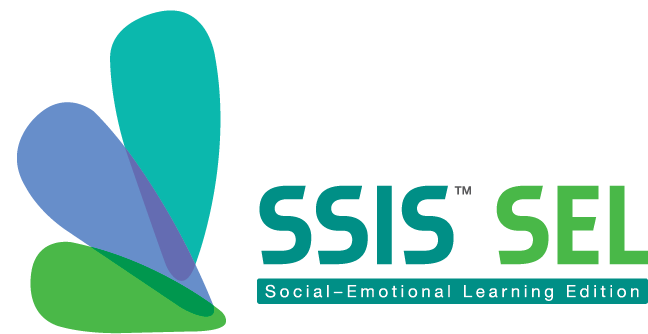
Prevention, positive behavior support, and response-tointervention initiatives are in many schools today as part of a multitiered system of supports (MTSS) designed to improve the social and academic lives of all students and to help create a positive school culture. A widely accepted framework for conceptualizing MTSS involves three levels (or tiers) of support services. Tier 1 support represents research-based core instruction for all students. Tier 2 support represents intervention targeted to approximately 15% of students who need extra support (e.g., more time, practice, and feedback) to improve, and Tier 3 support represents a more intensive intervention (e.g., more individualized, longer duration) for an estimated 5% to 10% of students.
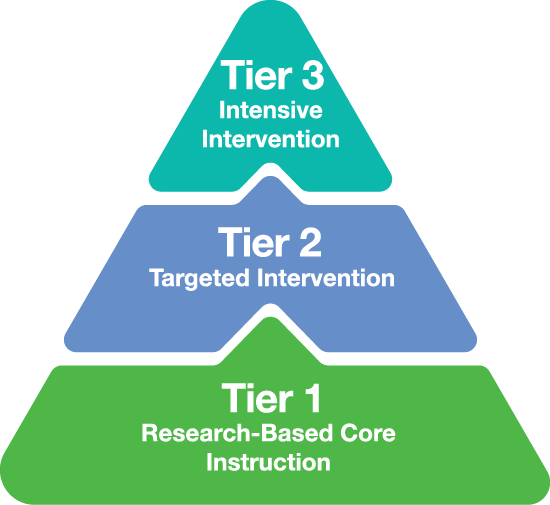
Effective MTSS management is predicated on (1) systematically identifying students’ needs, (2) using assessment data to guide decisions about the selection of effective strategies to improve student behavior and/or achievement, (3) implementing effective interventions, and (4) evaluating student progress and intervention outcomes (Glover, 2018). Although a number of MTSS initiatives for students experiencing reading and mathematics difficulties have been used successfully, there have been a number of challenges to implementing effective multitiered services focusing on improving students’ SEL skills. These challenges include a lack of an actionable skill development model, few reliable screening assessments aligned with a skill model and linked directly to interventions, a limited number of proven effective interventions that can be implemented in general education classrooms, and limited or no formal assessments for monitoring students’ progress.
The development of the SSIS™ SEL Edition assessments and Classwide Intervention Program (CIP; Elliott & Gresham, 2017a) was expressly designed to address each of these challenges to create sound multitiered support for improving students’ SEL skills. The SSIS SEL Edition is an extension of the widely used Social Skills Improvement System (SSIS) Rating Scales (Gresham & Elliott, 2008), the SSIS Performance Screening Guide (Elliott & Gresham, 2007b), and the SSIS Classwide Intervention Program (Elliott & Gresham, 2007a). All the revised tools were designed to measure or teach specific skills representative of the social–emotional competency model advanced by the Collaborative for Academic, Social, and Emotional Learning (CASEL, 2012). The SEL domains in this model are: self-awareness, selfmanagement, social awareness, relationship skills, and responsible decision making. The SSIS SEL Edition consists of three coordinated
• SSIS SEL edition screening/progress monitoring scales: This brief (30 to 40 minutes), class-based, criterion-referenced set of rating rubrics is used to assess student-based strengths and improvement areas across five SEL and three academic competencies. Completed by teachers, this assessment is used to identify current levels of SEL and academic functioning and can also be used to evaluate student progress in and outcomes of skill development programs (Elliott & Gresham, 2017b).
• SSIS SEL edition rating forms (teacher, parent, and student): These rating forms can be completed in 10 minutes or less by a teacher, parent, or student, and provide different viewpoints on the social–emotional functioning of an individual student. The Teacher Form consists of 58 items and is used to generate scores for each of the five SEL competencies, as well as a score for Academic Competence. The Parent Form (51 items) and the Student Form (46 items) are used to generate scores for the five SEL competencies and are available in English and Spanish (Gresham & Elliott, 2017).
• SSIS SEL edition classwide intervention program (CIP): Used by teachers or behavioral specialists, this program provides a comprehensive six-phase (Tell, Show, Do, Practice, Monitor Progress, and Generalize) approach for teaching social–emotional skills. It consists of scripted weekly lesson plans for each of the 10 core social–emotional skills, along with accompanying Digital Lessons and video vignettes that can be used to engage a class when teaching the skills. The table below provides details regarding each of the six instructional phases. In addition, it provides lesson plans for 13 advanced SEL skills. Additional intervention resources are provided, including Skill Steps Cue Cards, an Emotions Cue Card, Role-Play Cards, Student Engagement Records, parent letters, certificates of completion, and a form to document implementation fidelity and intervention outcomes. In sum, this intervention program provides educators with a SAFER—Sequenced, Active, Focused, Explicit, and Responsive—way to teach children social–emotional learning skills that represent core SEL competencies.
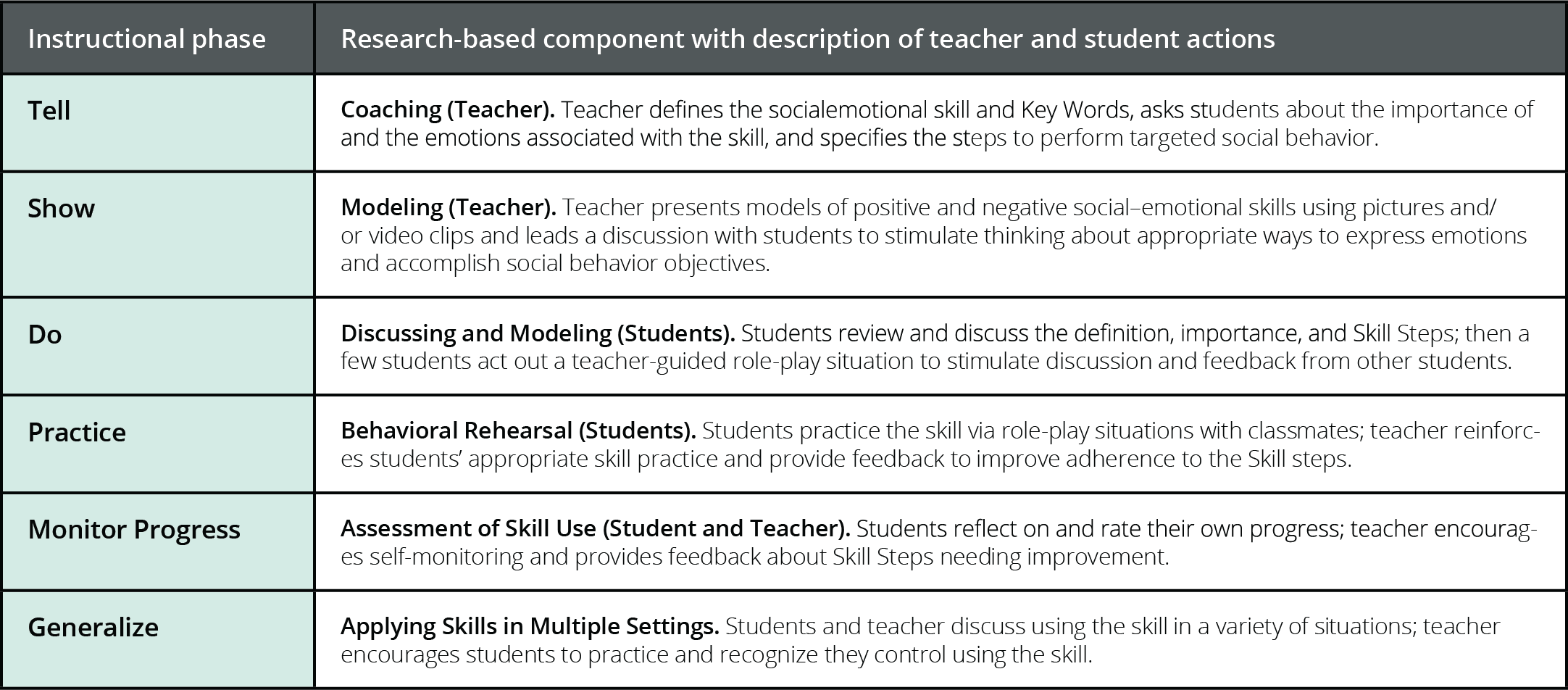
DiPerna and colleagues (2015, 2016, 2017), in a randomized control trial in elementary schools funded by the U.S. Department of Education, provided strong evidence to support that the SSIS SEL Edition CIP six-phase program resulted in students (1) learning social– emotional skills and performing these desired behaviors more frequently, (2) reducing the frequency of many common externalizing problem behaviors, and (3) increasing academic engagement and in some cases achievement test scores. This research documenting the triple positive impact of the SSIS SEL Edition CIP resulted in CASEL designating it “a SELect program for elementary students” (https:// casel.org/guideprogramssocial-skills).
The SSIS SEL Edition Screening/Progress Monitoring Scales and the rating forms can be administered and scored digitally or they can be administered via paper and scored digitally. Individual- and group-level reports are available, identifying relative strengths and weaknesses in social–emotional and academic functioning at the individual and group levels. Powerful reports for the SSIS SEL Edition Screening/Progress Monitoring Scales also are available via Review360® and are an important part of the data management for a multitiered program involving potentially hundreds of students.
This figure is from a progress monitoring report that illustrates how a group of 10 students, initially identified via a fall schoolwide screening as at risk, progressed after completing a second administration of the screener after 15 weeks of intervention with the SSIS SEL Edition CIP program. As illustrated, 8 of the 10 students improved their SEL skills from At Risk or Emerging levels of functioning to Emerging or Proficient levels; two students, however, actually got worse over the course of the intervention. These nonresponding students are likely in need of a more intensive intervention.
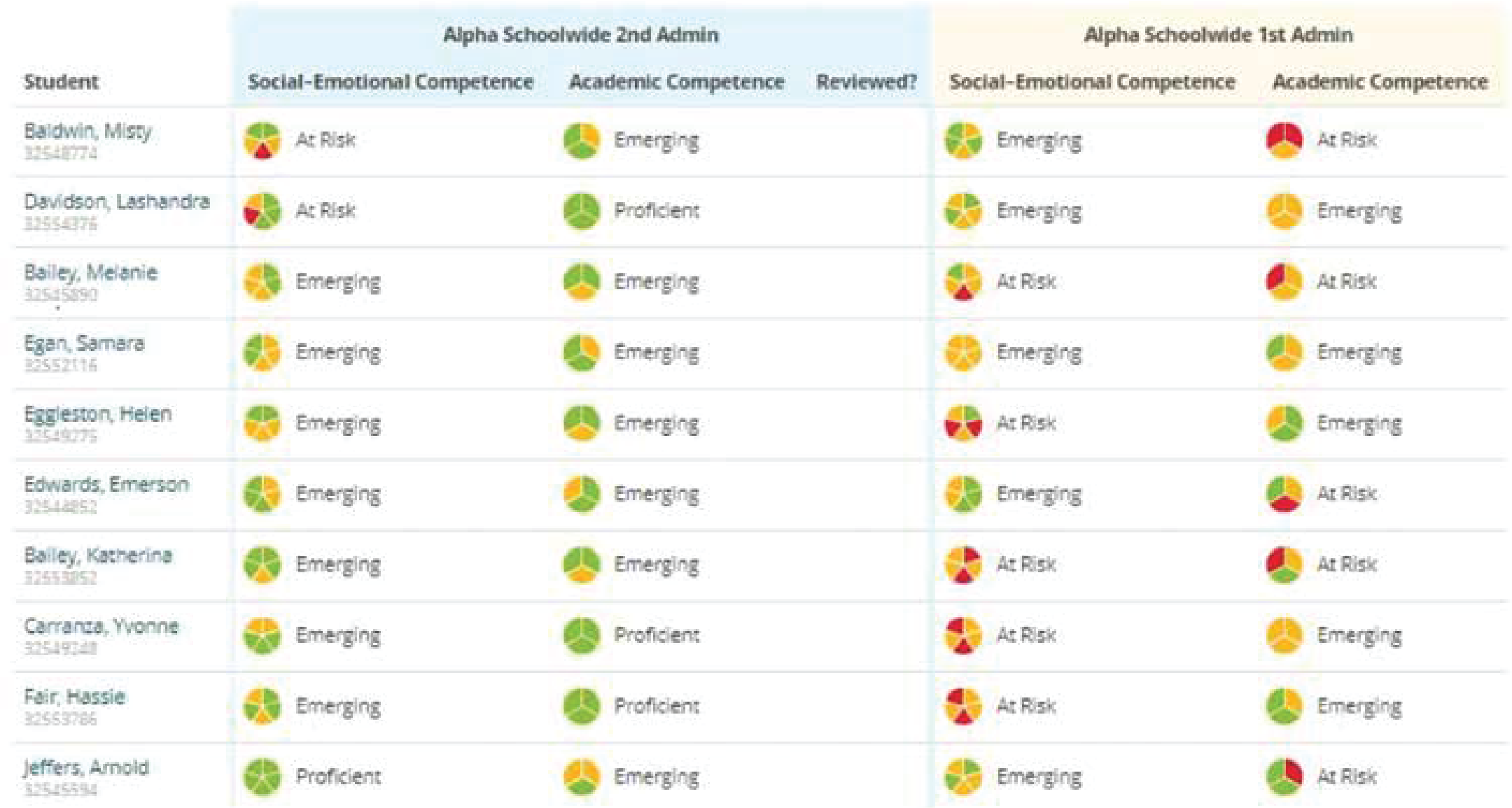
Actualizing an integrated and aligned SEL MTSS with the SSIS SEL edition
Given the goals of an MTSS approach to supporting all students and the array of SSIS SEL Edition tools, what would a fully integrated and content-aligned schoolwide program to advance students’ social–emotional skills look like?
This pyramid, with descriptions of assessment and intervention program resources starting at Tier 1 and progressing through Tier 3, highlight a systematic, data-driven sequence of actions using the valid and effective resources of the SSIS SEL Edition. A close inspection of the tiered actions indicates that screening results drive intervention skill unit selection; a multi-gate screening process is also viable at Tier 1 before allocating additional resources for Tier 2 services; intervention skill units can vary to meet the needs of students in all tiers; and progress monitoring of students’ responses to intervention especially for Tier 3 students, is possible.
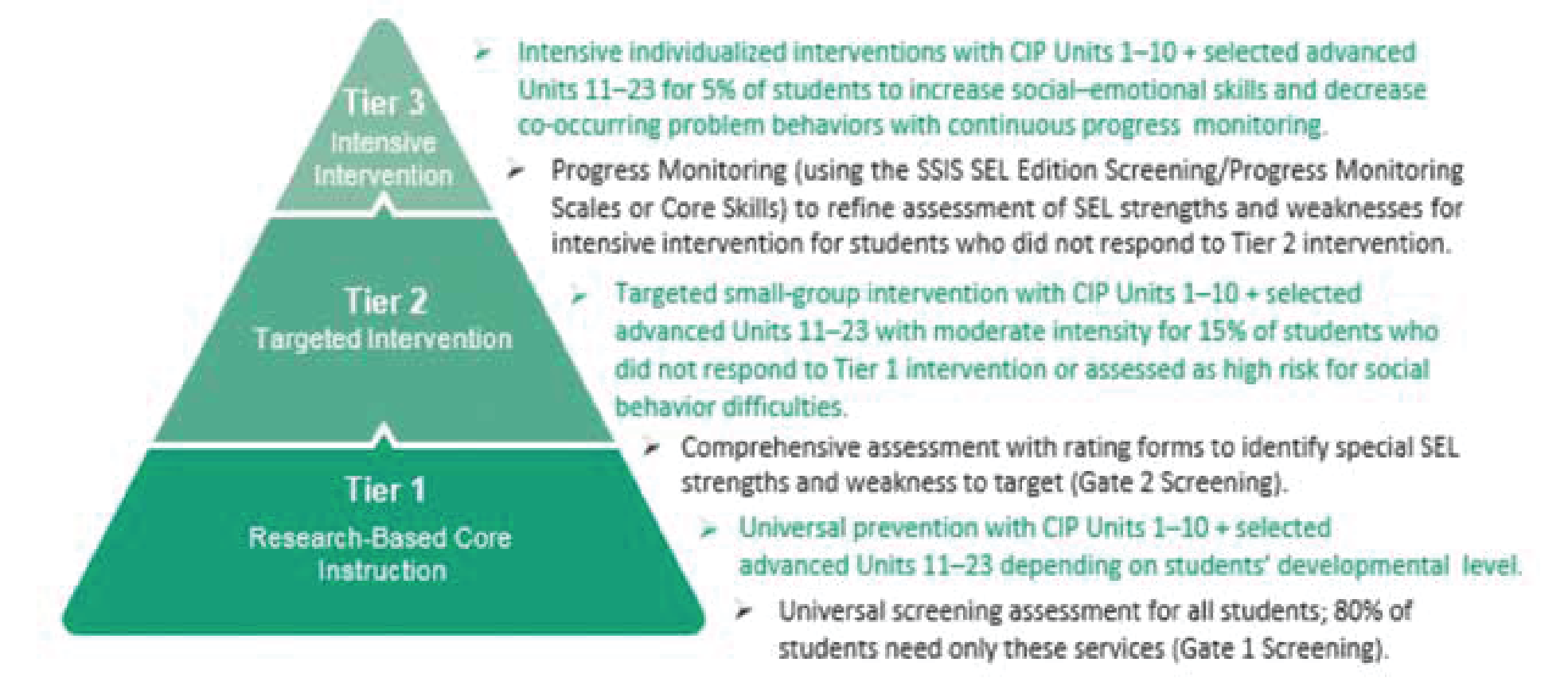
In summary, the SSIS SEL Edition family of assessments and intervention resources can be used in a flexible manner because they are each built on a common model of SEL competencies and focus on specific skills that are measurable and teachable. Leaders of MTSS programs designed to support the development of elementary and middle school students’ SEL skills will find the SSIS SEL Edition offers them some powerful and user-friendly tools proven to be effective.
References
Collaborative for Academic, Social, and Emotional Learning. (2012). Effective social and emotional learning programs. Retrieved from https://casel.org/wp-content/uploads/2016/01/2013-casel-guide-1.pdf
DiPerna, J. C., Lei, P., Bellinger, J., & Cheng, W. (2015). Efficacy of the Social Skills Improvement System Classwide Intervention Program (SSIS-CIP) primary version. School Psychology Quarterly, 30(1), 123–141. doi:10.1037/spq0000079
DiPerna, J. C., Lei, P., Bellinger, J., & Cheng, W. (2016). Effects of a universal positive classroom behavior program on student learning Psychology in the Schools, 53(2), 189–203. doi:10.1002/pits.21891
DiPerna, J. C., Lei, P., Cheng, W., Hart, S. C., & Bellinger, J. (2017). A cluster randomized trial of the Social Skills Improvement System-Classwide Intervention Program (SSIS-CIP) in first grade. Journal of Educational Psychology, 110(1), 1–16. doi:10.1037/edu0000191
Elliott, S. N., & Gresham, F. M. (2007a). Social Skills Improvement System Classwide Intervention Program teacher’s guide. Bloomington, MN: NCS Pearson.
Elliott, S. N., & Gresham, F. M. (2007b). Social Skills Improvement System Performance Screening Guide. Bloomington, MN: NCS Pearson.
Elliott, S. N., Gresham, F. M. (2017a). SSIS SEL Edition Classwide Intervention Program manual. Bloomington, MN: NCS Pearson.
Elliott, S. N., & Gresham, F. M. (2017b). SSIS SEL Edition Screening/Progress Monitoring Scales [Measurement instrument]. Bloomington, MN: NCS Pearson.
Glover, T. A. (2018). Response-to-intervention models and access to services for all students. In S. N. Elliott, R. J. Kettler, P. A. Beddow, & A. Kurz (Eds.), Handbook of Accessible Instruction and Testing Practices: Issues, Innovations, and Applications (2nd ed., pp. 157–166). New York, NY: Springer.
Gresham, F. M., & Elliott, S. N. (2008). Social Skills Improvement System rating scales [Measurement instrument]. Bloomington, MN: NCS Pearson.
Gresham, F. M., & Elliott, S. N. (2017). SSIS SEL Edition rating forms [Measurement instrument]. Bloomington, MN: NCS Pearson.
Stephen N. Elliott, PhD, is the Mickelson Foundation Professor at Arizona State University and the co-author of the SSIS SEL Edition Assessments and Classwide Intervention Program.
© 2018 Pearson Education, Inc. or its affiliates. All rights reserved. Pearson and SSIS are trademarks, in the US and/or other countries, of Pearson plc. LRNAS15520 EL 9/18
